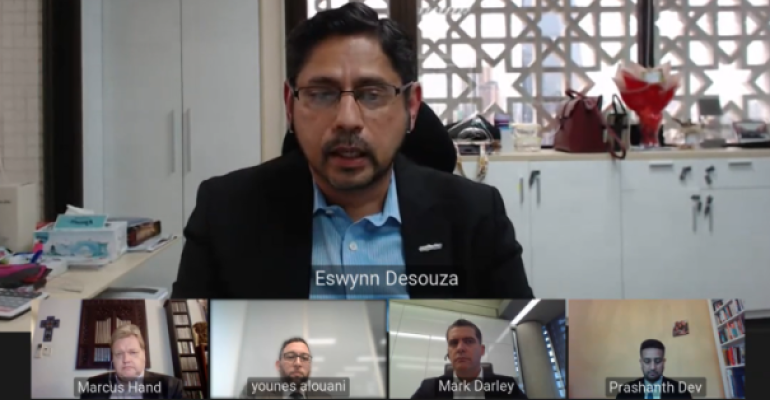Speaking at the webinar “Building and Operating Dual Fuel Vessels” hosted by Eaglestar and Presented by Seatrade Maritime News, speakers outlined the changes seafarers, shipowners and operators can expect when moving to handling new fuels.
Eswynn de Souza, Fleet Director, Fleet Operations Petroleum at Eaglestar Shipmanagement (S) Pte. Ltd. said it takes a complete change of mindset from engineers to navigators to staff ashore to internalise the change from handling liquids to gasses.
Younes Alouani, Senior Gas Manager & Advisor at Intertanko said that while there are additional components on dual-fuelled engines, the platforms are essentially similar from a safety standpoint. “Where safety differs on the gas supply and gas storage part of the engine,” said Alouani.
On the supply side, leaking gas pipes in on or the way to machinery spaces could cause catastrophic consequences, and so pipes are double-walled, leak detection systems are installed and emergency shutdowns are in place to prevent escalation of problems.
On the storage side, the cryogenic nature of LNG and other gas fuels limits the materials and systems that can be used in such cold environments, and insulation or gaps must be used to protect materials less suited to very low temperatures. For LNG in particular, controlling the pressure of storage tanks is also critical.
Mark Darley, Marine & Offshore (M&O) Chief Operating Officer, Lloyd's Register said that initially there would be few drydocks around the world that can handle fleets using mixed fuels, and many systems will require OEM specialists, all of which could increase costs.
The incentive for undertaking a move to dual fuel was presented by Prashanth Dev, Former Head of Freight Trading, Shell Trading, who said that charterers are looking for ways to cut their carbon emissions today, but with the ability to futureproof at a time of regulatory and technical uncertainty.
“Right now, LNG works because there is an established supply chain, people know how to use it and handle it and how to operate these vessels,” said Dev, and momentum is growing internally and externally for charterers, and there simply isn’t time to wait for perfect solutions.
“We have to act now as an industry, and the only solution that is out there today is to look at LNG dual fuel,” said Dev.
Darley said that while this wasn’t the first energy transition the maritime industry has been through, the last transition from coal to oil was much more straight forward. The move from coal to oil involved a fuel the industry knew the sources of and generally knew how to handle, but the transition still took 50 years; emissions targets mean the current transition with its less certain fuel future and more complex safety and handling requirements must take just 30 years.
A major part of that transition will be training the workforce, and while that might start with engineers and key ranks, the use of LNG as a fuel on an oil tanker as opposed to an LNG carrier requires a change of mindset from the whole crew, said de Souza.
MISC and Eaglestar have the advantage of operating LNG carriers, and deploy crew to LNG carriers to gain experience of loading and unloading operations after their initial gas training. This helps with the crtitical process of bunkering LNG for fuel, he added.
The panel agreed that training was crucial, and that the need for training extends to shore-based personnel as well as seafarers.
Watch the whole conversation Building and Operating Dual Fuel Vessels on demand for further insights on funding dual fuel vessels, knowledge transfer from LNG to emerging alternative fuels, and the panel’s thoughts on fugitive emissions and methane slip.
Copyright © 2024. All rights reserved. Seatrade, a trading name of Informa Markets (UK) Limited.
Add Seatrade Maritime News to your Google News feed.  |

